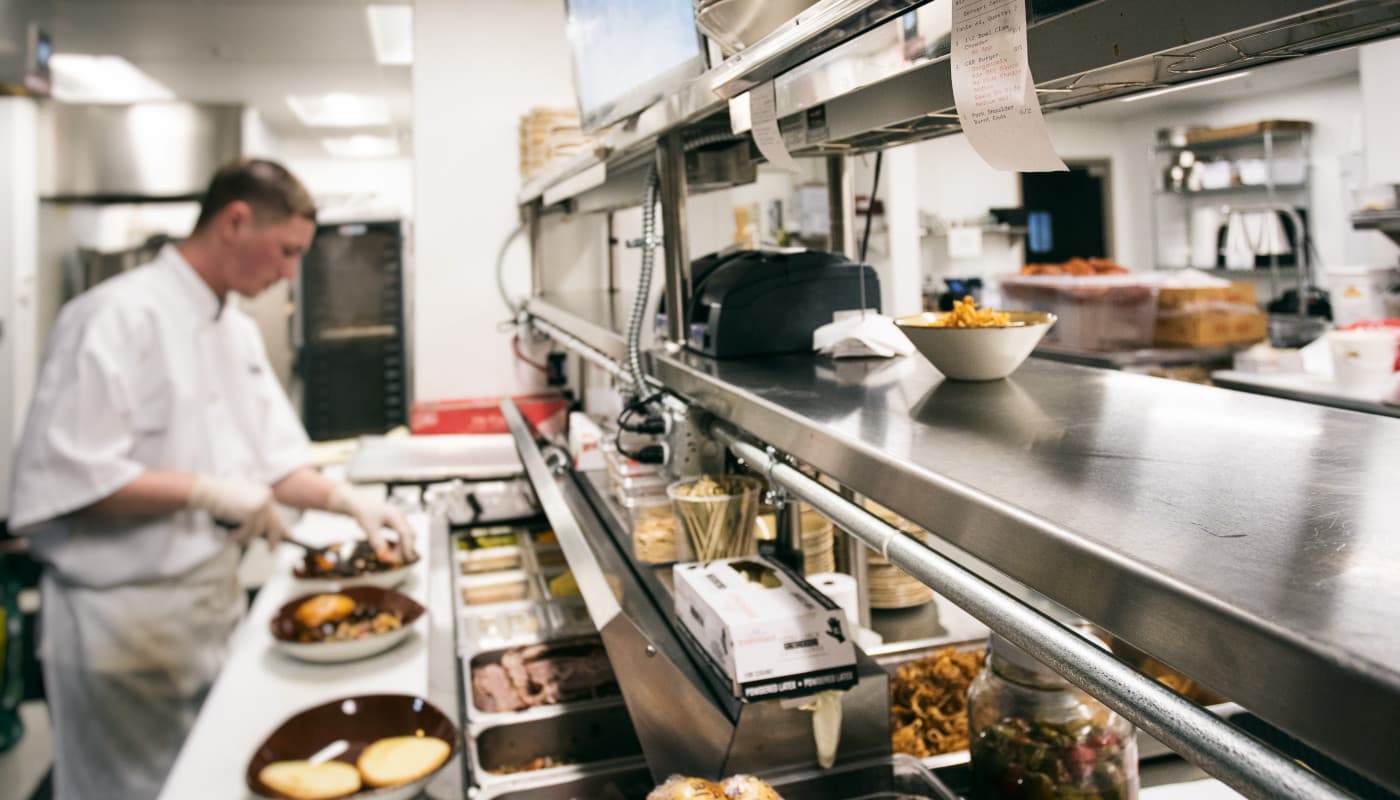Health code violations: What they are & how to prepare for an inspection
Editorial Team
6 min read
Cleanliness is important for any business – regardless of the industry and clientele. As a restaurant owner, however, following sanitation and food safety guidelines is essential for several reasons:
- Customers are unlikely to visit your establishment if it fails to meet basic standards for health and hygiene. As a result, it will be difficult to generate sales.
- Nearly every jurisdiction enforces food safety guidelines with punitive fines and potential closures for restaurants that rack up too many health code violations.
- According to the Centers for Disease Control and Prevention (CDC), about 48 million Americans get sick from foodborne contamination annually. Among these, an estimated 3,000 eventually succumb to their illnesses.1 You don’t want your restaurant to be associated with that kind of publicity – nor do you want to inadvertently put anyone’s life at risk.
These risks existed even before COVID-19. Now that the world is dealing with a pandemic, restaurants must take even greater precautions to protect their customers, employees, and reputations. Fortunately, the CDC has recently published principles to help restaurant owners navigate this terrain.
What are health code violations?
Although the Food and Drug Administration (FDA) maintains internal standards regarding food safety, there are no restaurant health code violations that apply nationally. Instead, these guidelines vary by jurisdiction and are administered at the local level.2 Most states split restaurant health code violations into low-, medium-, and high-risk categories.
1. Minor restaurant violations
Below are some examples that constitute minor health code infractions. These types of violations pose limited risk to your customers and may be easily fixed before the inspector’s next visit:
- Storing cooking supplies (such as oil) on the floor
- Not regularly cleaning exhaust vents
- Leaving produce on the kitchen counter for too long
2. Medium-risk health violations
The next category of health code violations deals with restaurant practices that – if not fixed – could potentially lead to contagion or illness. These need to be addressed as soon as possible, with some violations from this category potentially resulting in temporary closure:
- Improperly storing food supplies: In refrigerators, for example, raw fruits and vegetables should be stored away from raw meat, poultry, and seafood.
- Inappropriate temperature ranges for food prep and storage: To prevent bacterial buildup, infection, and spoiling, cooked food should remain at or above 140 degrees Fahrenheit, and cold food should be kept at or below 40 degrees Fahrenheit.3 These temperature ranges also apply to whatever utensils employees use to prep food. Shared tongs, spatulas, and ladles, for example, should be temporarily stored in hot water when not in use.
- Insufficient sanitation protocols in which surfaces, equipment, and dishes aren’t properly disinfected: Although every restaurant has its own way of doing things, many eating establishments designate green buckets for soap-based cleaning products and red buckets for antiseptic cleaning solutions.
3. Major restaurant violations
The last category of health violations deals with practices that have a high risk of leading to contagion or illness. In most cases, your restaurant could close indefinitely until these infractions are corrected:
- Lack of electricity or running water
- Pest infestations (e.g., rats, cockroaches, ants)
- Malfunctioning freezers, boilers, or furnaces
- Visible dirt, grime, and other signs of uncleanliness
How to pass a health inspection
Because guidelines vary by state, there is no universal health code violations list that applies in all situations. You’ll need to reference your state’s guidelines for an exact list.2 When inspectors make periodic visits to your restaurant, they’ll most likely be looking at these core categories:
- Temperature – e.g., the ranges used to safely store and cook food
- Health – e.g., whether you offer sick leave to reduce transmission risks
- Cleanliness – e.g., dirt, garbage, pests, and ventilation
- Hygiene – e.g., how often surfaces, utensils, and hands get washed
Focusing on these areas can help increase your odds of passing a health code inspection. However, COVID-19 has introduced several new health and safety concerns that you should integrate into your operations.
How to pass a health inspection in the age of COVID-19
The CDC has introduced updated health guidelines designed specifically for the hospitality sector.4 Many of these recommendations exceed most regional health codes, meaning that following these suggestions can further help increase your chances of successfully passing periodic inspections.
1. Social distancing
Offering delivery and curbside pickup is an effective way to reduce physical contact between staff and patrons. This is especially true if you use the right technology to promote social distancing. For example, we offer POS solutions for quick-service and full-service restaurants that:
- Allow waiters and cashiers to send orders to the kitchen wirelessly
- Come with online ordering capabilities for those who want to pick up their items or have them delivered
- Are NFC-enabled to facilitate contactless payments at the point of sale
Now is also a good time to revisit your sick leave policy. According to the CDC, 12 percent of restaurant employees report showing up to work while sick from serious conditions such as diarrhea or vomiting.5 Thus, you should make it as easy as possible for those with symptoms to stay home until they recover.
2. Personal protective equipment
Nearly all health experts agree that face coverings can help reduce transmission. Thus, you should mandate masks for everyone on your team – even in the kitchen. The CDC also recommends switching to disposable tablecloths, dishes, and cutlery whenever it is practical to do so. When it comes to menus, consider going digital and allowing customers to scan a QR code with their phones to place orders and pay for their meals.
3. Frequent disinfecting and washing
Disinfecting surfaces has always been important. With coronavirus fears, all restaurants should increase the frequency with which they clean their establishments.
The same goes for handwashing. It was necessary for all employees prior to COVID-19. Yet, it now makes sense to schedule regular intervals throughout the day. Ask every employee to periodically wash their hands with soap and water – regardless of what they were doing just prior. Additionally, have hand sanitizer stations readily available in areas such as at entrances, in the bathrooms, and in the kitchen.
With thin margins and quickly-changing consumer preferences, hospitality has always been a challenging field. The global pandemic continues to challenge the restaurant industry – a number of establishments have had to closet their operations forever.
We stand ready to help your restaurant continue to thrive. Schedule a free consultation with our merchant services team today.
The content provided in this blog is for informational purposes only. Nothing contained herein should be construed as legal, financial, tax, or medical advice. Readers should contact their attorneys, financial advisors, or tax professionals to obtain advice with respect to any particular matter. Please refer to www.cdc.gov and www.who.int for further information with respect to the coronavirus and COVID-19, and steps you can take to mitigate the related risks. Clover assumes no responsibility for any information contained on any third-party website.
The Clover trademark is owned by Clover Network, Inc.
1 “Burden of Foodborne Illness: Findings,” CDC.gov
2 “State Retail and Food Service Codes and Regulations by State,” FDA.gov
3 “Keep Food Safe! Food Safety Basics,” FSIS.USDA.gov
4 “Considerations for Restaurant and Bar Operators,” CDC.gov
5 “Food Workers Working When They are Sick,” CDC.gov
Related Posts
5 reasons restaurants partner with third-party delivery apps
6 awesome Clover apps every bar needs
Popular Topics
Stay In Touch
Sign up and learn more about Clover.
Thank you for your subscription!
Recent Stories
- Jewelry store supplies and equipment needed for opening day
- How small businesses can use employee discounts to retain staff
- Tips and tricks for opening an outdoor pop-up restaurant
Please share your contact information
to access our premium content.
Thank you for sharing your contact information.
Download Now





